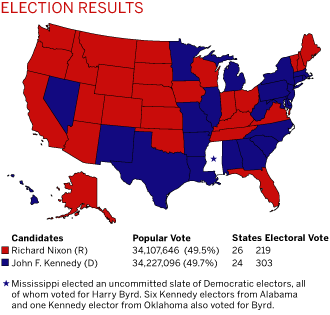1960 Kennedy VS. Nixon
"Mrs. JFK"
Transcript
The Living Room Candidate
"Mrs. JFK," Kennedy, 1960
Translation appears below transcript
JACQUELINE KENNEDY: Queridos amigos, les habla la esposa del senador John F. Kennedy, candidato a la presidencia de los Estados Unidos. En estos tiempos de tanto peligro, cuando la paz mundial se ve amenazada por el comunismo, es necesario tener en la Casa Blanca un líder capaz de guíar nuestros destinos con una mano firme. Mi esposo siempre vigilará los intereses de todos los sectores de nuestra sociedad que necesitan la protección de un gobierno humanitario. Para el futuro de nuestros niños y para lograr un mundo donde exista la paz verdadera, voten ustedes por el partido demócrata el día 8 de noviembre. Que viva Kennedy!
Translation:
JACQUELINE KENNEDY: My dear friends, I am the wife of Senator John F. Kennedy, candidate to the Presidency of the United States. In these times of danger when world peace is threatened by communism, it is necessary to have in the White House a leader who is capable of guiding our destiny with a firm hand. My husband will always watch over the interests of all sectors of our society who are in need of the protection of a humanitarian government. For the future of our children, and to achieve a world where true peace exists, vote for the Democratic Party on November 8. Long Live Kennedy!
Credits
"Mrs. JFK," Democratic National Committee, 1960
Maker: Guild, Bascom and Bonfigli
Video courtesy of the John F. Kennedy Presidential Library.
From Museum of the Moving Image, The Living Room Candidate: Presidential Campaign Commercials 1952-2012.
www.livingroomcandidate.org/commercials/1960/mrs-jfk (accessed December 18, 2025).
Save
| 1960 | Kennedy | Nixon | Results |
In 1960, America was enjoying a period of relative prosperity. With the exception of the stirrings of the modern civil rights movement, domestic turbulence was low, and the primary foreign threat seemed to be the intensifying Cold War. Fidel Castro came to power in Cuba in 1959, and installed a Communist regime just ninety miles off the coast of Florida. In May 1960, an American U-2 spy plane was shot down inside the Soviet Union, further intensifying tensions between the superpowers. The Republican nominee, Vice President Richard Nixon, was enjoying a growing reputation for his foreign policy skills after his televised "kitchen debate" with Soviet Premier Nikita Khrushchev in 1959. The Democratic nominee, charismatic Massachusetts Senator John F. Kennedy, was attempting to become the first Catholic president and, at age 43, the youngest man ever elected to the office. Nixon argued that he had the maturity and experience to deal with the Communists, while Kennedy attempted to turn his youth into an advantage, proclaiming in his acceptance speech at the Democratic convention, "We stand today on the edge of a new frontier."
Lyndon Johnson for vice president
"Kennedy: Leadership for the ’60s"
The Kennedy campaign produced nearly 200 commercials, which varied widely in subject and style. The variety was partly caused by disorganization within the media campaign, which was being handled by two competing agencies. Several Kennedy spots showcased his spontaneous speaking abilities, using excerpts from rallies, speeches, and debates. And there were a variety of endorsement ads: Jackie Kennedy’s
More than the ads, two key television events gave Kennedy his winning margin in 1960. The first was an impassioned speech to the Houston Ministerial Association in which he responded to concerns that Catholicism was incompatible with the secular office of president. In a confrontational arena, Kennedy’s manner was confident and assured as he proclaimed his allegiance to the separation of church and state and turned the issue into a question not of religion but of religious tolerance. Originally aired live throughout Texas, the Houston speech was edited into a half-hour commercial that was broadcast frequently throughout the campaign.
The second and more important event was the Kennedy-Nixon debate on September 26, the first of four televised general-election presidential debates. Kennedy appeared tanned, confident, and vigorous. Nixon, wearing no makeup and a light-colored suit that blended into the background, looked exhausted and pale, and sweated profusely. An estimated 75 million viewers tuned in to watch. The debate was also broadcast on radio to an audience of approximately fifteen million. Testifying to television’s visual impact, Kennedy emerged as the clear winner even though most radio listeners felt that Nixon had won.
Henry Cabot Lodge for vice president
"Nixon-Lodge: They Understand What Peace Demands"
In 1960, Nixon’s campaign instituted a procedure that became standard in subsequent Republican campaigns. Rather than hire an advertising agency, Nixon formed an ad hoc group and named it Campaign Associates. The group was headed by Carroll Newton, who had played a key role in both Eisenhower campaigns, and Ted Rogers, producer of the 1952 "Checkers" telecast (in which Nixon saved his vice-presidential nomination by answering corruption charges with an emotional speech made during a paid half-hour broadcast). This organizational structure gave Nixon direct control over his advertising, and allowed the group to recruit volunteers from several agencies.
Nixon used his 1960 commercials as a sort of rehearsal for the job. In a formal office setting, he spoke directly to the camera, giving detailed, forceful answers to questions posed by an offscreen speaker, and presenting himself as a tough, experienced leader able to stand up to the Communists. Polls showed that voters saw Nixon as stronger than Kennedy on foreign policy by a two-to-one margin, and saw Kennedy as stronger on domestic policy by the same ratio. Thus Nixon turned every question into a Cold War issue. About civil rights, he said, "We cannot compete with Communism without the full participation of all our citizens."
The message implicit in these ads was that while Nixon may not have been as charismatic or even as likable as Kennedy, he was a seasoned, mature leader ready to stand up to Khrushchev. Nixon’s ads also played to his foreign-policy strength by frequently including his running mate, former United Nations ambassador





















